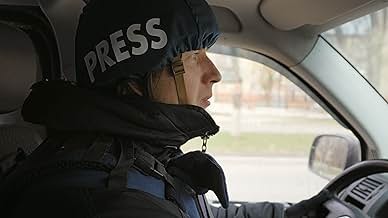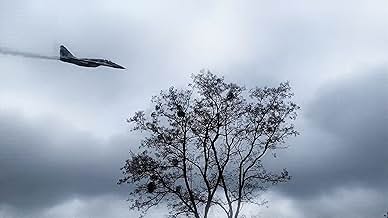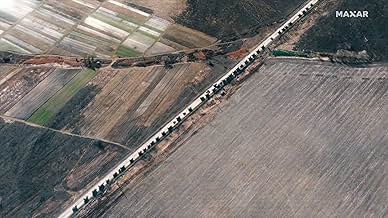À medida que a invasão russa começa, uma equipa de jornalistas ucranianos presos na cidade sitiada de Mariupol luta para continuar o seu trabalho de documentação das atrocidades da guerra.À medida que a invasão russa começa, uma equipa de jornalistas ucranianos presos na cidade sitiada de Mariupol luta para continuar o seu trabalho de documentação das atrocidades da guerra.À medida que a invasão russa começa, uma equipa de jornalistas ucranianos presos na cidade sitiada de Mariupol luta para continuar o seu trabalho de documentação das atrocidades da guerra.
- Direção
- Roteirista
- Artistas
- Ganhou 1 Oscar
- 35 vitórias e 51 indicações no total
- Self - Mariupol Resident
- (as Lyudmyla Amelkina)
- Self - Correspondent
- (cenas de arquivo)
- …
- Self
- (cenas de arquivo)
- Self - Minister of Foreign Affairs of Russia
- (cenas de arquivo)
- Self - Journalist
- (cenas de arquivo)
- Self - Russian Ambassador to the UN
- (cenas de arquivo)
- Self - Police Officer
- (as Volodymyr)
- Self - Deputy Mayor of Mariupol
- (cenas de arquivo)
- Self - President of Russia
- (cenas de arquivo)
- Self - U.S. Ambassador to the UN
- (cenas de arquivo)
- Self - President of Ukraine
- (cenas de arquivo)
Avaliações em destaque
My mother stayed behind in Mariupol. Despite the ominous warnings, nobody really expected a full-scale invasion with bombs and artillery. She lived directly across the street from hospital #2, which is where the filmmakers hid through much of the movie. In fact, her burning apartment building is the opening shot of "Day 16". The area all along Kuprina St, adjacent to the hospital and small church, sits at the very western edge of the city, which took the brunt of the attacks approaching from Crimea direction.
After surviving the initial bombings and attacks, Mom had to drink, cook, and clean herself with water from a well adjacent to shallow graves of her neighbors. Survivors chopped up furniture to burn for cooking. It was truly medieval in every way possible, and intentionally so. After 73 days trapped, she made it out by a miracle of good luck, but not before first going through Bezimmene filtration camp.
None of my family will watch this movie except me. Everything is too close and too familiar. One thing the movie does not show is how vibrant and thriving this same city had been prior to 2/24/22. It seems surreal to see your old comfortable neighborhood get intentionally destroyed on international news. To be honest, the Russians were so jealous of Mariupol that they tried to murder it. They cannot get away with this.
This is a story that absolutely needs to be seen and heard - without any sugar-coating - as painful as it may be.
I won't get into the usual critiques of quality or story flow. That would be idiotic. They captured what they could in the midst of war, when everything including electricity for their cameras was at scarce. It surprises me that some reviewers are complaining, as if this were some Hollywood production in the making for five years. Jesus.
I recommend watching it. The war is ongoing, and it won't just disappear because we're tired of it. It serves as a powerful reminder to the world about what's happening in Ukraine every day.
As the title indicates, this is a ground level view of events in the Ukrainian city of Mariupol in the first 20 days of the Russian invasion. A disembodied voice-over relates details and an ominous soundtrack magnifies certain moments but mostly, the footage speaks for itself. The basic set-up has journalist Mstyslav Chernov stay behind to film events as the horror of war escalates on a daily basis. From Chernov's position, we are put directly into the war zone and are confronted with the civilian experience. To this end, we are forced to see the terror and suffering that these innocent people are forced to endure on account of a war initiated for utterly disingenuous reasons. While this is clearly a film about the Ukrainian situation and the sheer wrongness of the Russian invasion, it also will get you thinking that it is also about war in general, as these shocking moments are happening all over our world as part of various military conflicts. We can become desensitised to this and our news reporting is often far too sanitised, allowing us to more easily disconnect. Its films like this one which approaches war in the opposite way and ensures the viewer has no easy escape.
This is a rare, you-are-there experience, in which you are immersed in the Russian takeover of a city in the Ukraine, and where you feel every emotion that these poor beseighed people feel.
The documentary starts on the week of March in which the Russian oligarch Putin (not the President, which would mean that he was elected) announces to the people of Ukraine that he is about to invade the country, and within moments, actually does launch a full-scale invasion, and we watch it happen almost moment by moment. Bombs fall on Soviet-style apartment complexes at a rate of hundreds a day, and the entire landscape soon begins to resemble the aftermath of Hiroshima.
But what is most dynamic is the actual impact on the people themselves, many of whom do not know who is bombing them. Astounding. Watching children, pregnant moms, and hospital workers taking the worst beating of all is utterly depressing, but, like all medicine, needs to be taken and swallowed whole.
Overall, this documentary is one of the most heart-wrenching, devastating, tear-jerking experiences ever. You owe it to yourself to see this to get the full effect, since words can never describe how much of an impact it will have on you.
It is a shame that it would only be available on PBS, since that will alienate at least 95% of the population that needs to watch it, but if there is even a smidgen of justice left in the world, the few who see it will tell everyone they know, and hopefully, something will come from it.
Thanks to the brave filmmakers who told this shocking story.
On February 24th, 2022 the city of Mariupol in Ukraine still looked normal. In the words of the narrator: "Wars don't start with explosions; it starts with silence." A Journalist team captures the outbreak of war, and documents how a city is reduced to ruins and rubble within just 20 days.
There are no actors here. There's no make-up, no CGI, no green/blue screen effects, no visual effects. We get to see the events unfold through the lens of a camera of men on the run fearing for their lives - raw footage. The documentary plays like a found footage sci-fi thriller, but this is real life with real people.
'20 Days in Mariupol' is harrowing to watch, and it is heartbreaking - more so because this is not fiction or fantasy. The film had me very emotional at times, so get that box of tissues before watching this. This ain't no popcorn flick; it is a hard-hitting documentary. Yes, it is depressing - as war generally is - but the world needs to see this. I'm so glad '20 Days in Mariupol' won the Oscar for Best Documentary. The film editing was also very good.
Você sabia?
- CuriosidadesA photograph by Evgeniy Maloletka of the injured pregnant woman being carried from the maternity hospital, was awarded "World Press Photo of the Year" in 2023. Her name was Irina Kalinina (32 years old). Her baby, named Miron (after the word for 'peace') was stillborn, and then his mother died in half an hour.
- Citações
Self - Narrator and interviewer: When we were in the hospital, one of the doctors told me, "War is like an X-Ray. All human insides become visible. Good people become better, bad people worse".
- ConexõesFeatured in 2024 EE BAFTA Film Awards (2024)
Principais escolhas
- How long is 20 Days in Mariupol?Fornecido pela Alexa
Detalhes
- Data de lançamento
- Países de origem
- Centrais de atendimento oficiais
- Idiomas
- Também conhecido como
- 20 Days in Mariupol
- Locações de filme
- Empresas de produção
- Consulte mais créditos da empresa na IMDbPro
Bilheteria
- Faturamento bruto mundial
- US$ 35.971
- Tempo de duração1 hora 37 minutos
- Cor
- Mixagem de som
Contribua para esta página

























